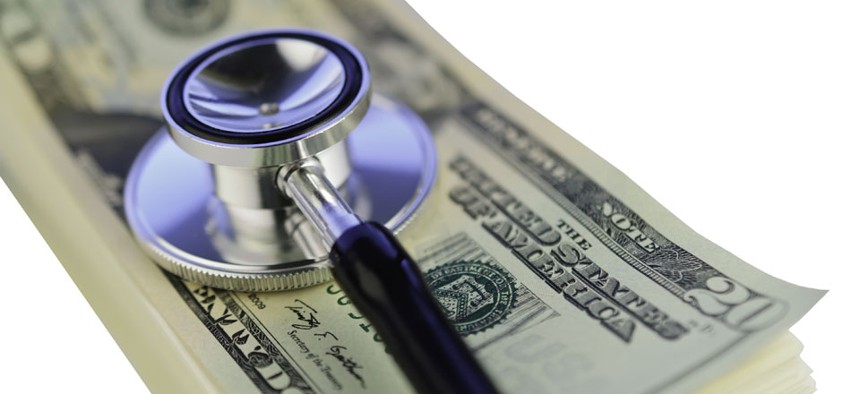
Ken Schulze/Shutterstock.com
Poll: Don't Tie Shutdown to Obamacare Funding
Overwhelmingly, Americans think Congress should fund the federal government and deal with health care separately.
Americans are divided on who deserves blame for the government shutdown, but one thing's certain: A solid majority thinks it's wrong to demand changes to Obamacare as a price for reopening the government.
The latest United Technologies/National Journal Congressional Connection Poll finds little consensus on whom to blame for shutting down the government -- 38 percent say it's the Republicans, 30 percent say it's President Obama, and 19 percent say it's both.
But public opinion is clearer on the House GOP's approach: Overwhelmingly, Americans think Congress should fund the federal government and deal with health care separately; and just as strongly, Americans oppose including GOP priorities -- even those with which they otherwise agree -- in a bargain to raise the debt ceiling.
The results portend political risk for Republicans should they continue to employ their current approach. Americans oppose those tactics, the data show, and if the government breaches its debt limit, triggering broad-based economic turmoil, Americans could hold Republicans responsible.
The current installment of the United Technologies/National Journal Congressional Connection Poll was conducted Oct. 3-6 by Princeton Survey Research Associates International. The poll surveyed 1,000 adults, half via cell phone, and carries a margin of error of plus or minus 3.7 percentage points.
Half of the poll's respondents disapprove of Obama's handling of negotiations over the shutdown, according to results from the same survey commissioned by the Pew Research Center. But congressional GOP leaders still score worse on this measure: 69 percent disapprove of the way they are handling the budget negotiations, while only 19 percent approve. Congressional Democrats fall in between: 29 percent approve and 58 percent disapprove.
Even though roughly half those surveyed in the current poll think the administration is mainly or equally to blame for the shutdown, and Obama and Democrats are underwater on the issue, Americans -- by a vast ratio of more than 2-to-1 -- disapprove of the House GOP tying the future of the Affordable Care Act to funding the government or raising the debt ceiling.
The poll shows that 65 percent think "Congress should provide the funding to keep the government operating and deal with the health care issue separately." Just 24 percent think the House "is right to fund the continuing operations of the federal government only if Obama agrees to delay or withdraw his health care plan."
Democrats are nearly unanimous on funding the government, while Republicans favor the House GOP position, though by a narrower margin (50 percent to 38 percent). Among independents, 66 percent think Congress should fund the government, and 23 percent think House Republicans are right.
The overall results are similar to a pre-shutdown United Technologies/National Journal Congressional Connection Poll, which found 27 percent of respondents thought the government should only be funded if the health care law was delayed or stricken, and 63 percent thought Congress should approve the funding and deal with health care separately.
The numbers are similar when it comes to the fight over extending the nation's borrowing limit. Following other questions about ways to reduce the country's deficit and the perceived ramifications of failing to raise the debt limit, poll respondents were told that congressional Republicans "say they will only agree to increase the federal debt ceiling if President Obama accepts their proposal on other issues." Interviewers then asked about four GOP policy proposals—some of which have been found to be popular in previous surveys—but respondents said they opposed including every one of them in a debt-limit agreement by at least a 2-to-1 ratio.
Asked whether a "one-year delay for the implementation of President Obama's health care law" should be included, 31 percent said it should, while 65 percent said it should be dealt with separately. Opposition ran just as strongly for tying "cuts in spending for domestic discretionary programs" and "cuts in Medicare, Medicaid, and other federal entitlement programs" to the debt-ceiling bill, with the poll finding results virtually equivalent to delaying the health care law.
The add-on generating the strongest opposition is also likely the most popular: Only 24 percent think that "a requirement that President Obama authorize the construction of the Keystone pipeline to transport oil from Canada to the U.S." should be part of a debt-limit agreement, while 70 percent think it should be separate. A United Technologies/National Journal Congressional Connection Poll in July found more than two-thirds of Americans supported building the Keystone XL pipeline, though that question included arguments on both sides of the issue and didn't attach the project to raising the debt ceiling.
(Image via Ken Schulze/Shutterstock.com)






